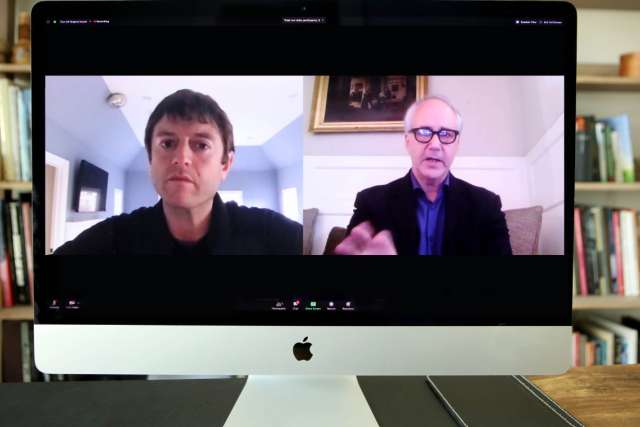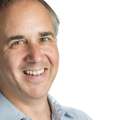A recently announced research partnership between UCLA Health and its Institute for Precision Health and the Regeneron Genetics Center (RGC), a genetics-focused division of the New York-based company Regeneron, is an enormous stride toward the creation of a new paradigm in medicine, one in which a person’s genetics becomes an essential roadmap to identify his or her disease risks and provide preventive treatment. “We now are at a watershed moment, ready to take a big step toward that reality,” says Daniel H. Geschwind, MD (RES ’95, FEL ’97), PhD, Gordon and Virginia MacDonald Distinguished Professor of Neurology, Psychiatry and Human Genetics and director of the Institute for Precision Health at UCLA. “We are close to reaching a turning point in the way health care will be delivered for our patients and our community.”
Building on genotyping work already underway at UCLA, UCLA Health and the RGC will provide whole-exome sequencing for 150,000 UCLA Health patients who have consented to participate in the UCLA AtLAs biobank to analyze their genetic makeup and discern heretofore unknown gene mutations that may influence a patient’s health. Genotyping, which is targeted to a specific place in the DNA, looks for a predefined set of variants; whole-exome sequencing analyzes thousands of protein-coding genes and provides information on many more mutations.
Using a needle-and-haystack analogy, genotyping looks for predetermined needles in a specific location, while sequencing searches more of the haystack to detect unexpected needles. “We believe in the power and promise of genetics-based medicine,” says Aris Baras, MD, head of the RGC and senior vice president at Regeneron. “Ordering whole-exome genetic testing may eventually become as commonplace as ordering routine lab work, and it will give physicians a better chance to offer earlier intervention and better outcomes for patients.” Drs. Geschwind and Baras spoke about the collaboration with UCLA Health Executive Director of Communications Judy Fortin.
Let’s begin by talking about what this collaboration between UCLA Health and the RGC will mean.
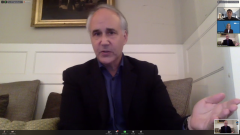
Dr. Daniel Geschwind: It’s a very exciting partnership. Regeneron has expertise in population-level genetics and sequencing to identify new drug targets and for other purposes in drug development. Working with the RGC, we will be able to do what’s called “whole-exome sequencing” — sequencing the protein-coding part of the genome in 150,000 UCLA patients, which would represent a cross-section of patients from the standpoints of age, disease and ethnicity. Dr. Aris Baras: Together, we will be able to integrate genomics with broader information about the health of study participants to understand how one’s genome drives health and disease. UCLA has been a leader in genomics and in doing trials and large-scale studies like this. Ultimately, we will enroll several hundred thousand people — and it could be many more — with the goal of discovering new genes that cause diseases and, with academic and biotech researchers working together, developing targeted therapies to treat those diseases. It is a massive undertaking that will drive the use of genomics forward for better diagnoses, prognoses and overall patient health.
How is this different from previous genome-sequencing efforts that have been undertaken at UCLA?

Dr. Geschwind: Most genome-sequencing at the academic level has been primarily research oriented. This is taking that research to the next level, toward something that is actionable. We’ve talked for some time about the promise of precision medicine — a time when preventive measures and targeted treatments can be individualized to each patient’s genetic makeup. Through this collaboration, we will be sequencing a broad spectrum of patients who are not part of medical studies, but are coming to UCLA as part of their medical care, and who have opted to participate in our research and biobanking efforts to use genetics to understand the origins of a patient’s conditions — not just for diseases like cancers, but for many diseases and health conditions — and implement preventive strategies that could alter their health outcome for the better. That would be pretty remarkable. Currently, this represents a few percent of our population, but as our knowledge base grows from this project, so will patients who are affected.
What makes UCLA the right place for this endeavor?
Dr. Geschwind: Being in Los Angeles is an important factor, of course, aside from UCLA’s broad excellence across the health system and university. This city and region have tremendous ethnic diversity, which is critical to understanding genetic variability across different populations and developing new treatments that precisely target diseases. The population of our region is a microcosm of the world, which makes UCLA Health an ideal setting for this project with Regeneron.
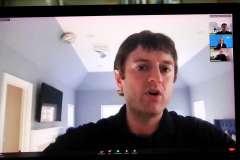
Dr. Baras, what made you and your colleagues at Regeneron say, “We want to work with UCLA Health”?
Dr. Baras: We have collaborated with a number of different institutions over the past several years, but there are very few that are as strong in both innovation and research and as forward-thinking and that have the leadership and the ability — and that have put the necessary resources behind it — to do something of this scale. The work being done at UCLA is on par with what some countries are doing, in terms of the scale of the effort. That caught our eye; we want to do something at a massive scale. By working with an institution with the depth of UCLA Health’s patient care and research expertise — as well as the diverse patient population that Dr. Geschwind mentioned — we will begin to return valuable results to patients in the short term while we’re accumulating important data to fuel the discovery and development of targeted, specific medicines that will move the entire field forward.
Can we elaborate a bit more on the goals and outcome you would like to see as a result of this collaboration?
Dr. Geschwind: The first is being able to start implementing this forward-thinking genomic preventive medicine, where we are identifying patients who have known conditions before they may even be aware they have them, and then doing what we can to prevent them. That’s really a new paradigm in health care where genetics will become really important. The second significant goal is discovery. There’s an enormous amount of genetic discovery to be made. We don’t know what the genetic component of most disorders is, but by surveying a very large and diverse number of people, we will have the statistical power to identify common genetic factors and rare mutations that cause disorders across multiple populations. With that information, we can begin to create risk scores and be able to stratify patients — this will be on a research basis — to see if we can implement better therapies tailored to a patient’s individual needs. Knowing the genetic basis of a disorder helps us understand the potential mechanism of that disorder and develop more targeted therapeutics and find the new medicines of the future that can help us treat and, hopefully, cure so many of the untreatable diseases we still have today.
Who is most likely to derive a benefit from this collaboration?
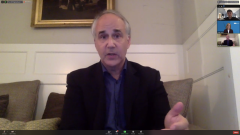
Dr. Baras: Everyone. Whether someone is a direct participant in this study or not, they stand to benefit from its fruits. What happens in this study will write the book for how patients and their family members five years from now, 10 years from now, will receive treatment from a tremendously more efficient and modern version of genomic medicine. There will be the direct benefit to patients, but also it will create so much new knowledge that it will revolutionize our understanding of the genome and new applications in medicine. This genomic revolution will be like what we saw happen decades ago with the tech revolution and semiconductor technology. Cell phones and iPads and laptops didn’t use to be the norm; now they are ubiquitous and everywhere. This is what is happening now in genomics and medicine; it is going from niche to routine.
Dr. Geschwind, you called this a “watershed moment.”
Dr. Geschwind: It’s a watershed moment in that we’re at the beginning of a new future of medicine where we take a genomics-first approach and our understanding of genetics plays a significant role in the care that we deliver to patients. Once we have demonstrated the benefits, we will learn how to implement this in large-scale populations in an efficient way and use it optimally to improve health. What does being engaged in this work mean to you, both professionally and personally? Dr. Geschwind: I was not trained as a geneticist, but over the course of my initial clinical training, I became aware of how important genetic predisposition was in so many of the disorders and conditions that I was seeing as a clinical neurologist. After some 22 years running a research laboratory at UCLA, it was obvious how remarkable genetics has been in leading to a new understanding of disorders — especially brain disorders that I was working on, ranging from autism to neurodegeneration and Alzheimer’s. So, I have seen this remarkable revolution in medicine over the course of my career. We’re really just in the first wave, but there are going to be multiple waves as we move forward and develop even greater knowledge and discover new therapies. It is very exciting for me to take those experiences I have had in my own research and delivery of clinical care and take some of that pioneering spirit from the laboratory and do something at an institutional level where there really is the capability of leading in the world in this new direction that has such enormous promise for our patients and communities.
Dr. Baras: It is hard to describe the impact that work like this has on patients. We have seen it in other collaborations we have had — not on a scale as large as what we are doing with UCLA Health, but similar collaborations in which we have returned genetic results back to patients, and we have sat with those patients, and they have told us their stories. They move us to tears. It is remarkable to hear how studies like this change people’s lives, how, in many cases, they have saved their lives. So, on a personal level, this is incredibly real and incredibly impactful. It makes a huge difference. And that’s a really nice thing. On a professional level, it’s really all about the future and being on this ride with pioneers like UCLA as part of this revolution in genomic medicine. This is a once-in-a-lifetime opportunity to really revolutionize the practice of medicine. And that is incredibly rewarding.
